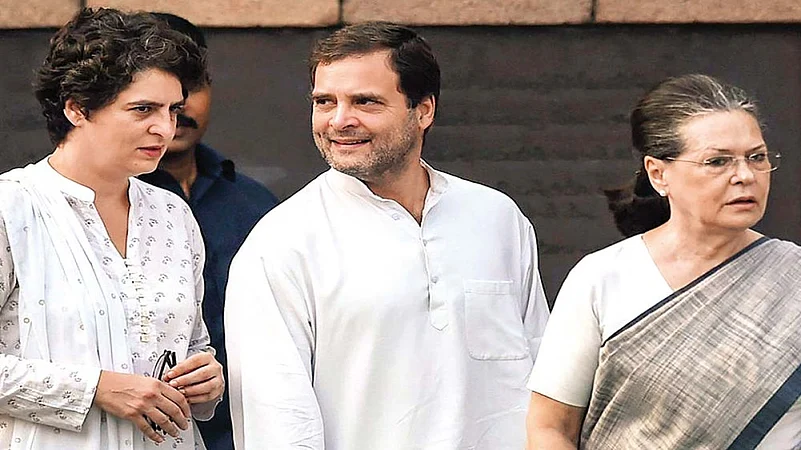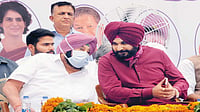The recent defection of former Union minister Jitin Prasada, once a confidant of Rahul Gandhi, to the BJP has sent the political grapevine in a tizzy, with speculation on other possible high-profile exits from the Congress—including that of former Union ministers R.P.N. Singh and Milind Deora, also trusted lieutenants of Rahul in the past. Sources say backchannel talks have been initiated to prevent those like Singh—like Prasada, he is from Uttar Pradesh, where the Congress is desperately seeking revival in next year’s assembly polls—from jumping ship. These efforts haven’t met with much success, especially as Rahul seems unfazed by the desertions. “For every Prasada and Jyotiraditya Scindia (another Rahul aide who quit the party last March and helped the BJP topple the Congress government in Madhya Pradesh) who left after taking everything from the party, there are hundreds who joined to serve selflessly,” says spokesperson Pawan Khera.
Sonia Gandhi, meanwhile, is back to playing her familiar peacemaker role—soothing frayed nerves, massaging inflated egos and deflating imminent mutinies. Rahul, say sources, has shed his past proclivity for promoting pedigreed dynasts to key roles and, like Priyanka, wants to “mentor and encourage” first-generation politicians. As those rewarded in the past want guarantees of a perpetually ascendant political career, this has made Sonia’s task of keeping the flock together all the more difficult. Negotiating a difficult truce between Punjab CM Captain Amarinder Singh and his detractors, particularly Navjot Singh Sidhu, Sonia has also revived arbitration between Rajasthan CM Ashok Gehlot and his archrival Sachin Pilot. While Amarinder Singh is likely to rejig his cabinet, sources suggest he may still “have his way”—even if Sidhu is made deputy CM, the post may be shared with another leader and the former cricketer kept out of the coveted state unit chief’s post.
Last August, Sonia had formed a three-member committee, comprising Priyanka Gandhi Vadra, Ajay Maken and the late Ahmed Patel, to resolve issues raised by Pilot and MLAs loyal to him, who unsuccessfully pushed for a coup against Gehlot. This committee never met, claim Pilot loyalists. A senior leader involved with defusing the Rajasthan crisis says a rapprochement is finally being worked out with Pilot, and that Gehlot will soon carry out a cabinet reshuffle accommodating several Pilot loyalists.
Then there’s the question of extending an olive branch to defiant veterans like Ghulam Nabi Azad and Kapil Sibal. A senior Congress functionary says Azad’s return to the Rajya Sabha, possibly from Tamil Nadu with the DMK’s support, is not ruled out. Sonia is said to be mulling over other adjustments within the central and various state units to accommodate colleagues, both old and young, with key responsibilities. She also has to confront some home truths about her party’s continuing electoral decline.
On May 11, the interim Congress chief constituted a five-member panel under Ashok Chavan to analyse the causes of the party’s decimation in Bengal, Assam, Kerala and Pondicherry. “Obvious lapses such as factional feuds, poor choice of candidates, delay in finalising the campaign, organisational rot and lack of coordination have been highlighted for each state, but the blame has been largely put on state units and some AICC office bearers,” says a panel member. “Not a single leader who spoke to the committee blamed Sonia, Rahul or Priyanka.” The panel has submitted its report, but a Congress Working Committee meeting to discuss the findings and suggest correctives has not been convened yet.
Moreover, Sonia needs to ensure that the twice-delayed election to appoint her successor—it is widely anticipated to be Rahul again—is held without further adieu. Recent assembly poll results reinforced the perception that regional satraps such as Mamata Banerjee and M.K. Stalin or old warhorses like Sharad Pawar are better equipped to take on the BJP than a Gandhi-led but seemingly headless Congress. Realignment of a non-NDA federal front either entirely without the Congress or with the Grand Old Party playing a supporting role is being hotly debated. Within the Congress, the prospect of the party losing its centrality in the Opposition due to an ad hocleadership that can’t stem the organisational rot and electoral decline is an expectedly worrying notion.


























